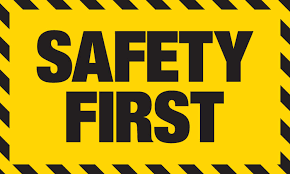 One of the main tasks of the Pesticide Information Office, is to help teach pesticide safety, or applicator safety. Applicator safety involves more than just protecting from pesticide exposure. Safety does include understanding the label, PPE, and proper product usage, but these are only one part. This blog will feature some of the other possible risks pesticide applicators must protect against while doing their jobs.
One of the main tasks of the Pesticide Information Office, is to help teach pesticide safety, or applicator safety. Applicator safety involves more than just protecting from pesticide exposure. Safety does include understanding the label, PPE, and proper product usage, but these are only one part. This blog will feature some of the other possible risks pesticide applicators must protect against while doing their jobs.
Other Risks to Consider
There are many tools that applicators must utilize to get their job done. Because of this diverse set each of these tools comes with their own possible risks and as such safety for each must be considered for total applicator safety. The tools used for the job and the job site itself can pose danger beyond just pesticide exposure and these dangers can include, but aren’t limited to:
- Vehicle safety
- Trips and falls
- Power equipment safety
- Ladder safety
- Wildlife encounters
- Weather safety

Vehicles are one of the most frequent dangers and because of this comfort many take it for granted. In order to increase safety always perform proper vehicle maintenance, follow all rules of the road, use defensive driving, and avoiding distracted driving (looking at you hands on phone users). All of that can improve vehicle safety.
In Florida our weather poses a serious risk with the frequency of lightning the state experiences. Because lightning can strike on a seemingly clear day maintaining situational awareness is the best way to avoid possible danger. That same situational awareness can reduce the risk of injury with things like ladders as well, be sure to always be aware of electrical powerlines when working with ladders!

Situational Awareness
Situational awareness applies to more than just weather and powerlines. Many applicators work outside and come across wildlife like bees, snakes, dogs, bears, and yes in Florida, Gators! Because of this varied wildlife try to understand the wildlife you might encounter. Observe their behavior and keep your distance where possible. Some of you may not think bears a realistic threat! However, there is a phrase that originated in north central Florida that suggests differently. The phrase “Bear Caught” came from this part of the state and was made popular by the book and movie Cool Hand Luke. Those who have worked in hot humid climates can get a knot in the stomach, become weak in the knees, and hit the ground hard, as if hit by a bear. No this isn’t a hairy mammal knocking you down, it’s the heat…

Heat Related Illness
With so many applicators working outside, sometimes in hot PPE like Tyvek suits, it means that heat poses a very serious risk. In Florida heat stress is important and is possibly the number 1 risk our applicators face. Knowing the signs of heat related illness and the proper steps to take is paramount. The Centers for Disease Control (CDC) and the National Institute for Occupational Safety and Health (NIOSH) produced a great guide for being aware of and treating heat related illness (https://www.cdc.gov/niosh/mining/UserFiles/works/pdfs/2017-128.pdf).

Types of Heat Stress
Heat Rash – Red bumps or blisters that can occur due to excessive sweat and irritation. Keeping dry, taking frequent breaks to cool off, and even powders for drying can help with heat rash.
Heat Cramps – Cramps that commonly show up in arms, legs, and abdomen. Proper hydration and frequent breaks can reduce/eliminate cramping. If cramps do not subside within 1 hour medical attention should be sought.
Heat Exhaustion – Headache, nausea, dizziness, extreme thirst, high body temp, decrease urination are all signs of this serious medical condition. At this point medical attention should be sought and work activity ceased. Get to a cool location, drink fluids and remove unnecessary clothing like hats, shoes, and socks to aid cooling. Until medical help can arrive, misting with water, moving air, finding A/C can all be used.
Heat Stroke – This is a possible fatal situation and immediate medical attention is required. Confusion, slurred speech, loss of consciousness, profuse sweating, dry skin, seizures are all possible symptoms. Immediately move to a cool location, drink fluids, circulate cool air and call for immediate medical help. THIS IS A MEDICAL EMERGENCY!
Conclusion
Pesticide applicators face many potential risks, of which pesticide exposure is only one. From vehicle safety, weather dangers, and even encounters with bears! Don’t let the mammalian or the heat related kind catch you.
Safety is NOT a piece of equipment or simple avoidance; it is a mindset for ALL aspects of the job.
Click to Subscribe
Additional Resources
Vehicle safety – https://www.cdc.gov/vitalsigns/motor-vehicle-safety.html
Ladder safety – https://www.americanladderinstitute.org/page/BasicLadderSafety
Wildlife safety – https://www.fws.gov/news/blog/index.cfm/2016/7/8/Wildlife-Safety-Tips-for-Enjoying-the-Great-Outdoors
Origins of Bear Caught – https://www.waywordradio.org/bear-caught-sunstroke/
 0
0
